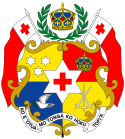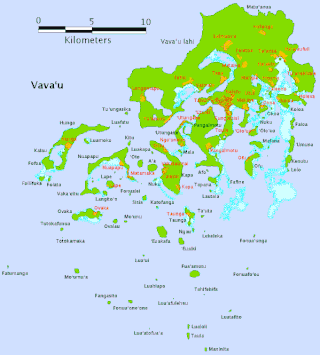 |
|---|
| Constitution |
| Administrative divisions |
General elections were held in Tonga in May 1969. [1]
 |
|---|
| Constitution |
| Administrative divisions |
General elections were held in Tonga in May 1969. [1]
The Legislative Assembly had seven directly-elected members; three representing Tongatapu and nearby islands, two representing Haʻapai and two representing Vavaʻu and nearby islands. [2] A further seven members were elected by the nobility based on the same constituencies, [1] seven ministers (including the governors of Haʻapai and Vavaʻu) and a Speaker chosen by the monarch. [3]
Three incumbent MPs (Pousima Afeaki and Lopeti Tofaimalaealoa of Haʻapai and Lopoi Tupou of Tongatapu) lost their seats. [1]
| Constituency | Elected members | |
|---|---|---|
| Commoners | ||
| Haʻapai | Tevita Sale Taufa | |
| Latunipulu Unga | ||
| Tongatapu | Tuilatai Mataele | |
| Vili Ahio Vaipulu | ||
| Sekonaia Tu'akoi | ||
| Vavaʻu | Lataipouono Niusini | |
| Masao Paasi | ||
| Source: Pacific Islands Monthly | ||
The newly elected Legislative Assembly was opened by King Tāufaʻāhau Tupou IV on 19 June. [1]

The history of Tonga is recorded since the ninth century BC, when seafarers associated with the Lapita diaspora first settled the islands which now make up the Kingdom of Tonga. Along with Fiji and Samoa, the area served as a gateway into the rest of the Pacific region known as Polynesia. Ancient Tongan mythologies recorded by early European explorers report the islands of 'Ata and Tongatapu as the first islands having been hauled to the surface from the deep ocean by Maui.

Nukuʻalofa is the capital and largest city of Tonga. It is located on the north coast of the island of Tongatapu, in the country's southernmost island group.

George Tupou I, originally known as Tāufaʻāhau I, was the first king of modern Tonga. He adopted the name Siaosi, the Tongan equivalent of George, after King George III of the United Kingdom, when he was baptized in 1831. His nickname was Lopa-ukamea, meaning iron cable.
Tuʻi Kanokupolu (chiefs) are a junior rank of the Haʻa Tuʻi in Tonga.

Vavaʻu is an island group, consisting of one large island and 40 smaller ones, in Tonga. It is part of Vavaʻu District, which includes several other individual islands. According to tradition, the Maui god created both Tongatapu and Vavaʻu, but put a little more effort into the former. Vavaʻu rises 204 m (669 ft) above sea level at Mount Talau. The capital is Neiafu, situated at the Port of Refuge.
Fīnau ʻUlukālala was a dynasty of six important hereditary chiefs from Vavaʻu, currently in the kingdom of Tonga. The dynasty began sometime in the 18th century and died out in 1960. The chief's original estate was Tuʻanuku, and his nickname and that of the village is Tavakefaiʻana.
Early general elections under a new electoral law were held in Tonga on 25 November 2010. They determined the composition of the 2010 Tongan Legislative Assembly.

General elections were held in Tonga on 1 May 1981. Seven nobles were elected by their peers, whilst a further seven People's Representatives were publicly elected.

Fatafehi Fakafānua, known before ascending to his title as Fatafehi Kinikinilau Lolomana‘ia Fakafānua, is a Tongan politician, Lord of the Realm and the Speaker of the Tongan Legislative Assembly. He is the 8th Fakafānua.

Tēvita ʻUnga was the first Crown Prince and Prime Minister of Tonga.

General elections were held in Tonga on 27 November 2014. All twenty-six elected seats in the single-chamber Legislative Assembly were up for election, although the monarch, acting on the advice of his Prime Minister, retains the possibility to appoint members to Cabinet from outside Parliament, thus granting them a non-elected ex officio seat in Parliament.
General elections were held in Tonga on 16 November 2017 to elect 17 of the 26 seats to the Legislative Assembly. King Tupou VI dissolved the Assembly on 25 August 2017 on the advice of its Speaker, Sialeʻataongo Tuʻivakanō, who claimed that Prime Minister ʻAkilisi Pohiva was attempting to claim powers held by the King and Privy Council within Cabinet.

General elections were held in Tonga in 1930.

General elections were held in Tonga in May 1948.

General elections were held in Tonga on 28 May 1954. An amended electoral law had been passed in 1951 to allow women to vote for the first time in the elections; however, a technical error in the legislation was discovered that meant the franchise could not be extended in time to take effect for the 1954 elections.

General elections were held in Tonga on 27 May 1963.

General elections were held in Tonga in 1951

Princess Mele Siuʻilikutapu of Tonga is a Tongan royal and former politician. In 1975 she was elected to the Legislative Assembly, becoming its first female member.
Harry Percival Vete was a Tongan businessman, politician, and member of the Legislative Assembly of Tonga. He was an early member of the Church of Jesus Christ of Latter-day Saints in Tonga.

General elections were held in Tonga on 18 November 2021 to elect 17 of the 26 seats in the Legislative Assembly.